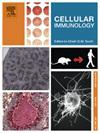PGC1α-mediated mitochondrial fitness promotes Treg cell differentiation
IF 2.9
4区 医学
Q2 CELL BIOLOGY
引用次数: 0
Abstract
Regulatory T (Treg) cells play a critical role in the maintenance of immune tolerance to self-antigens and suppression of excessive immune responses. They employ a distinct metabolic profile from other CD4 T cell subsets to support their differentiation and suppressive function, which is characterized by enhanced mitochondrial metabolism. Although PGC1α is considered a master regulator of mitochondrial biogenesis and function, its role in Treg cell differentiation remains unclear. Herein, we demonstrated that PGC1α is highly expressed in Treg cells compared to other CD4 T cell populations. Using a pharmacological approach, we found that its transcriptional activation in iTreg cells enhanced mitochondrial fitness, characterized by increased expression of mitochondrial genes, mitochondrial mass, and metabolic activity. Moreover, PGC1α activation enhanced both mouse and human iTreg cell differentiation, while its inhibition reduced this process. Therefore, our findings shed light on the potential role of PGC1α as a pharmacological target when manipulating Treg cells as a therapeutic strategy.
pgc1 α介导的线粒体适应度促进Treg细胞分化
调节性T (Treg)细胞在维持对自身抗原的免疫耐受和抑制过度免疫反应中发挥关键作用。它们采用与其他CD4 T细胞亚群不同的代谢谱来支持其分化和抑制功能,其特征是线粒体代谢增强。虽然PGC1α被认为是线粒体生物发生和功能的主要调节因子,但其在Treg细胞分化中的作用尚不清楚。在此,我们证明了与其他CD4 T细胞群相比,PGC1α在Treg细胞中高度表达。使用药理学方法,我们发现其在iTreg细胞中的转录激活增强了线粒体适应性,其特征是线粒体基因表达、线粒体质量和代谢活性增加。此外,PGC1α激活可以促进小鼠和人iTreg细胞的分化,而抑制PGC1α则可以降低这一过程。因此,我们的研究结果揭示了PGC1α作为治疗策略操纵Treg细胞时的药理学靶点的潜在作用。
本文章由计算机程序翻译,如有差异,请以英文原文为准。
求助全文
约1分钟内获得全文
求助全文
来源期刊

Cellular immunology
生物-免疫学
CiteScore
8.20
自引率
2.30%
发文量
102
审稿时长
30 days
期刊介绍:
Cellular Immunology publishes original investigations concerned with the immunological activities of cells in experimental or clinical situations. The scope of the journal encompasses the broad area of in vitro and in vivo studies of cellular immune responses. Purely clinical descriptive studies are not considered.
Research Areas include:
• Antigen receptor sites
• Autoimmunity
• Delayed-type hypersensitivity or cellular immunity
• Immunologic deficiency states and their reconstitution
• Immunologic surveillance and tumor immunity
• Immunomodulation
• Immunotherapy
• Lymphokines and cytokines
• Nonantibody immunity
• Parasite immunology
• Resistance to intracellular microbial and viral infection
• Thymus and lymphocyte immunobiology
• Transplantation immunology
• Tumor immunity.
 求助内容:
求助内容: 应助结果提醒方式:
应助结果提醒方式:


